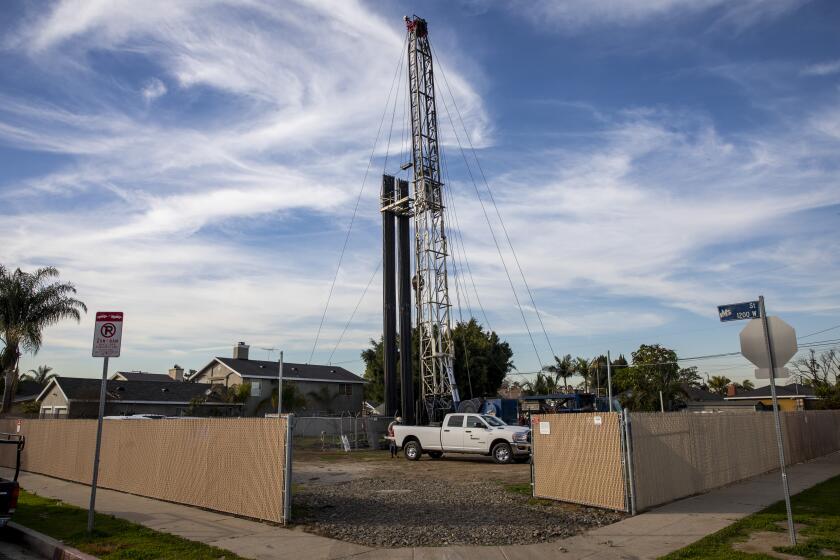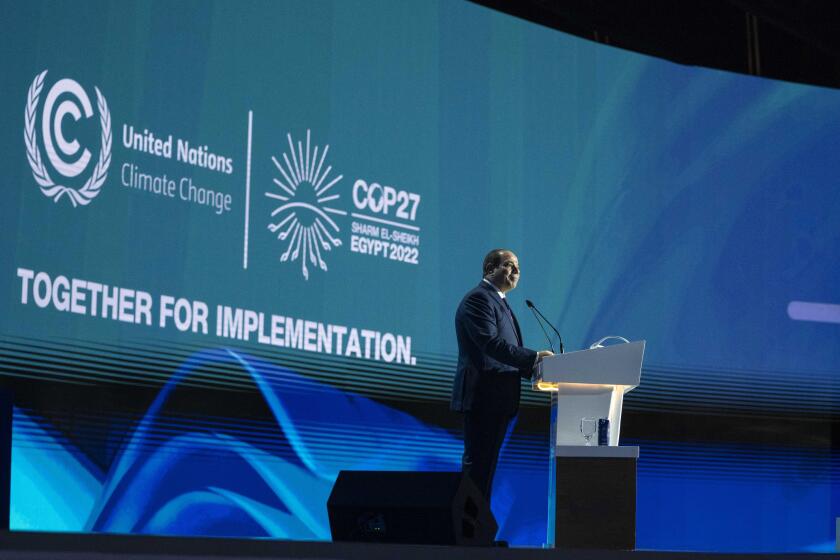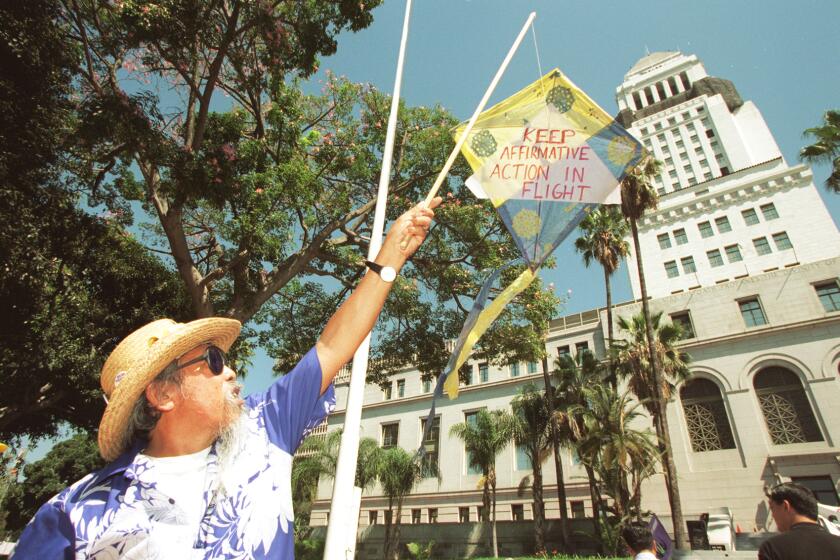
- Share via
My two elementary school-aged daughters started classes this fall during one of California’s most severe and prolonged heat waves on record.
Their school was built a lifetime ago, in the 1940s, and without air conditioning. Temperatures in the Los Angeles area where we live have increased by about 2 degrees on average since then, but most of the school’s classrooms still lack cooling, and plans to install it are years away.
My kids came home exhausted and thirsty, their faces red and heads dripping with sweat. But they never complained. And that was the most disturbing part. I don’t want them to accept as normal a world that we are so dangerously altering with our pollution.
Evidence of the changing climate has been piling up fast where we live. In just the last few years, we’ve endured record-breaking heat, had our air fouled with choking wildfire smoke and are suffering another multiyear drought that’s among the worst ever recorded. What we’ve experienced is only a preview of what’s to come. Because leaders aren’t doing enough to cut emissions and prevent catastrophic global warming.
The oil industry wants to put a referendum on the ballot to overturn California’s ban on neighborhood drilling. Californians shouldn’t fall for it.
But how do I explain to the people I love most that the world as it existed when I grew up is already a memory? That their inheritance is a life with greater suffering, scarcity and loss because adults with the power to change things don’t care enough to stop burning fossil fuels?
As an environmental reporter, I have written over and over about how the pollution we keep dumping into the air is hurting people, threatening ecosystems and endangering our future. But at home, I’ve struggled to explain this to my own daughters.
Because being a father helped me grasp that humanity’s failure to address climate change is transgenerational violence against our own children and their future children and grandchildren.
Unless we act fast, average global temperatures are on track to rise a horrific 5 degrees within my daughters’ lifetime. When they’re grown up, I imagine they will have a hard time understanding why we did so little to stop it.
It has been challenging to find ways to talk to kids as young as mine without being too much of a downer. I want to be honest with them, but at the same time I don’t want to burden them with dread.
A new agreement to compensate poor nations for the effects of global warming is an important step for climate justice. But it will be hollow victory until world leaders take decisive action to end fossil fuels.
My daughters are in kindergarten and second grade. So when I talk to them I keep it simple, telling them we need to switch everything to clean electricity made by the wind and the sun so we don’t keep polluting the air and making it even hotter. But when I bring it up, they sometimes react with silence. I think that’s because they don’t want to talk about something so negative. My oldest says it’s because they’re still learning and just don’t know what to say.
Here’s an example: We were in the car when they noticed a big orange flame shooting out of a snarl of metal piping off the freeway and asked what it was. I tell them it’s a refinery that turns oil into gasoline for cars, and that the more gas we use, the more it pollutes.
“What do you think about that?” I ask.
The kindergartner shrugs her shoulders. Her big sister goes back to reading her book.
But I discovered that when I turn it into a game, they usually want to play along. So I’ll sometimes quiz them with a series of questions about what is better for the planet:
Driving to school or walking?
Walking. That one was easy.
Taking the light rail to the concert or driving there?
“The train, because it carries more people and doesn’t use gas,” my older daughter says.
They like the challenge, and ask for harder questions.
Running the air conditioning in the summer, or the gas furnace in the winter?
They’re not so sure. So I tell them that the air conditioning runs on electricity that can be made with solar panels and wind turbines, but for now, the heat comes from burning methane gas.
Oh, air conditioning then. Correct.
It feels a bit like environmental indoctrination, and it can be hard to know whether it’s sinking in.
Opponents of affirmative action argue that simply eliminating it will automatically create a level playing field for all students. It won’t.
I’ve consulted articles and videos about how to talk to your kids about climate change in a candid, yet age-appropriate way.
Among their suggestions: Break down the science in simple, understandable ways. Listen to their fears and hopes, and acknowledge your own. Explain to them that there are solutions. And let them know that other kids are demanding change, and that their actions can make a difference too.
I am also trying to teach by example. So over the past couple of years, our family has started to make small changes in how we live, not just because it is necessary but to demonstrate to my daughters that we are not powerless. We put solar panels on the roof of our house and bought an electric countertop induction cooktop to use while we save up to replace our gas stove. We toss our food scraps in a backyard compost bin, take public transportation when we can and plan to replace our aging gas car with an electric one as soon as we can afford it.
I know these words and actions are small, and they can seem almost insignificant compared to the scale and scope of the climate crisis. It will not be enough to leave my kids with the world they deserve, but I want them to know that I not only told them the truth, I tried to do something about it.
More to Read
A cure for the common opinion
Get thought-provoking perspectives with our weekly newsletter.
You may occasionally receive promotional content from the Los Angeles Times.













